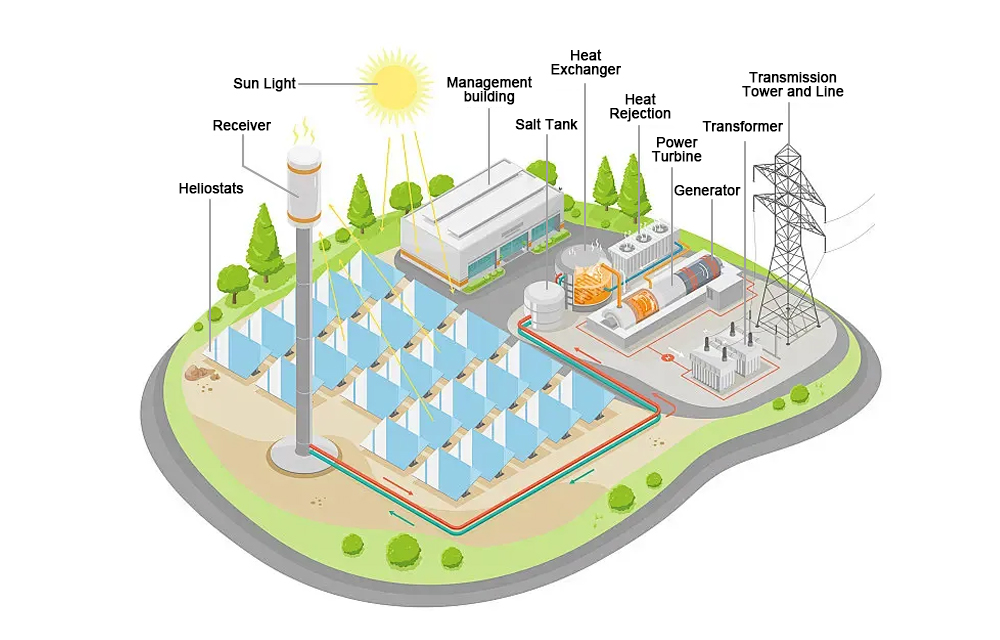The Benefits of Commercial Solar
In an era marked by escalating energy costs, heightened environmental concerns, and a strong push towards sustainability, businesses are increasingly turning to renewable energy solutions. Among these, commercial solar power stands out as a transformative option. EnterSolar explores the myriad benefits of commercial solar energy from a professional perspective, highlighting its impact on cost savings, environmental responsibility, energy independence, and corporate image.
One of the most compelling reasons for businesses to adopt commercial solar energy is the substantial cost savings. Solar panels convert sunlight into electricity, reducing reliance on the grid and, consequently, cutting down on monthly energy bills. Over time, the savings can be significant, often recouping the initial investment within a few years.
2. Tax Incentives and Rebates
Governments and local authorities worldwide offer various incentives to encourage the adoption of solar energy. These include tax credits, rebates, and grants that can offset a substantial portion of the installation costs. For instance, in the United States, the Federal Investment Tax Credit (ITC) allows businesses to deduct a percentage of their solar system costs from their taxes, significantly lowering the upfront investment.
3. Depreciation Benefits
In addition to tax credits and rebates, businesses can take advantage of accelerated depreciation benefits through programs like the Modified Accelerated Cost Recovery System (MACRS) in the U.S. This allows companies to depreciate the value of their solar energy systems over a short period, further enhancing the financial attractiveness of solar investments.

2. Sustainable Business Practices: Adopting solar energy is a powerful statement of a company’s commitment to sustainability. It demonstrates proactive steps towards reducing environmental impact and fostering a greener future. This commitment can enhance corporate social responsibility (CSR) initiatives, which are increasingly important in today’s business landscape.
Solar power provides businesses with greater energy security and reliability. By generating their own electricity, companies become less dependent on the grid, insulating themselves from energy price volatility and supply disruptions. This is particularly beneficial in areas prone to power outages or where the grid infrastructure is unreliable.
2. Energy Storage Integration
Pairing solar power systems with energy storage solutions like batteries can further enhance energy independence. Stored solar energy can be used during peak demand periods, at night, or during grid outages, ensuring a continuous power supply. This capability can be crucial for businesses where operational continuity is vital.
2. Competitive Advantage: Incorporating solar energy can provide a competitive edge. Companies that reduce their operational costs through solar power can potentially offer lower prices or invest savings in other areas of the business, such as research and development or marketing. Moreover, a strong sustainability profile can differentiate a company in a crowded market, attracting talent, customers, and investors who value environmental responsibility. To explore how your business can benefit, contact us for more information.

Effective implementation of commercial solar systems begins with a thorough site assessment. Factors such as roof space, orientation, shading, and local climate conditions must be considered to optimize system performance. Working with experienced solar professionals can ensure that the system is tailored to meet specific energy needs and maximize efficiency.
2. Financial Planning and ROI Analysis
Conducting a detailed financial analysis is crucial. Businesses should evaluate the total cost of ownership, including installation, maintenance, and potential savings. Calculating the return on investment (ROI) and payback period will provide a clear understanding of the financial benefits over the system’s lifespan.
3. Regulatory and Compliance
Navigating the regulatory landscape is an important aspect of commercial solar implementation. Businesses must ensure compliance with local building codes, zoning laws, and permitting requirements. Engaging with professionals who are knowledgeable about the regulatory environment can streamline the process and prevent legal complications.
2. Integration with Smart Grids: The integration of solar power systems with smart grids represents a significant trend. Smart grids use digital technology to monitor and manage energy flow, improving efficiency and reliability. Businesses can benefit from dynamic pricing, demand response programs, and real-time energy management, further optimizing their solar energy use.
Financial Advantages of Commercial Solar
1. Significant Cost SavingsOne of the most compelling reasons for businesses to adopt commercial solar energy is the substantial cost savings. Solar panels convert sunlight into electricity, reducing reliance on the grid and, consequently, cutting down on monthly energy bills. Over time, the savings can be significant, often recouping the initial investment within a few years.
2. Tax Incentives and Rebates
Governments and local authorities worldwide offer various incentives to encourage the adoption of solar energy. These include tax credits, rebates, and grants that can offset a substantial portion of the installation costs. For instance, in the United States, the Federal Investment Tax Credit (ITC) allows businesses to deduct a percentage of their solar system costs from their taxes, significantly lowering the upfront investment.
3. Depreciation Benefits
In addition to tax credits and rebates, businesses can take advantage of accelerated depreciation benefits through programs like the Modified Accelerated Cost Recovery System (MACRS) in the U.S. This allows companies to depreciate the value of their solar energy systems over a short period, further enhancing the financial attractiveness of solar investments.

Environmental and Sustainability Benefits
1. Reduction in Carbon Footprint: Commercial solar power systems, including off-grid solar inverters, generate clean, renewable energy, significantly reducing a business's carbon footprint. By decreasing reliance on fossil fuels, companies can lower greenhouse gas emissions and contribute to global efforts to combat climate change. This not only helps the environment but also aligns businesses with the growing consumer and investor preference for environmentally responsible companies.2. Sustainable Business Practices: Adopting solar energy is a powerful statement of a company’s commitment to sustainability. It demonstrates proactive steps towards reducing environmental impact and fostering a greener future. This commitment can enhance corporate social responsibility (CSR) initiatives, which are increasingly important in today’s business landscape.
Energy Independence and Reliability
1. Energy Security and ReliabilitySolar power provides businesses with greater energy security and reliability. By generating their own electricity, companies become less dependent on the grid, insulating themselves from energy price volatility and supply disruptions. This is particularly beneficial in areas prone to power outages or where the grid infrastructure is unreliable.
2. Energy Storage Integration
Pairing solar power systems with energy storage solutions like batteries can further enhance energy independence. Stored solar energy can be used during peak demand periods, at night, or during grid outages, ensuring a continuous power supply. This capability can be crucial for businesses where operational continuity is vital.
Corporate Image and Market Competitiveness
1. Enhanced Corporate Image: Businesses that adopt solar energy can significantly enhance their corporate image. Consumers, investors, and stakeholders are increasingly favoring companies that prioritize sustainability and environmental responsibility. Solar energy adoption showcases a company’s commitment to innovative, forward-thinking practices, attracting eco-conscious customers and partners. For those looking to take the next step, Company EnterSolar provides solutions tailored to your needs.2. Competitive Advantage: Incorporating solar energy can provide a competitive edge. Companies that reduce their operational costs through solar power can potentially offer lower prices or invest savings in other areas of the business, such as research and development or marketing. Moreover, a strong sustainability profile can differentiate a company in a crowded market, attracting talent, customers, and investors who value environmental responsibility. To explore how your business can benefit, contact us for more information.

Strategic Implementation Considerations
1. Site Assessment and System DesignEffective implementation of commercial solar systems begins with a thorough site assessment. Factors such as roof space, orientation, shading, and local climate conditions must be considered to optimize system performance. Working with experienced solar professionals can ensure that the system is tailored to meet specific energy needs and maximize efficiency.
2. Financial Planning and ROI Analysis
Conducting a detailed financial analysis is crucial. Businesses should evaluate the total cost of ownership, including installation, maintenance, and potential savings. Calculating the return on investment (ROI) and payback period will provide a clear understanding of the financial benefits over the system’s lifespan.
3. Regulatory and Compliance
Navigating the regulatory landscape is an important aspect of commercial solar implementation. Businesses must ensure compliance with local building codes, zoning laws, and permitting requirements. Engaging with professionals who are knowledgeable about the regulatory environment can streamline the process and prevent legal complications.
Future Trends and Technological Advancements
1. Innovative Solar Technologies: The solar industry is continuously evolving, with advancements in technology leading to more efficient and cost-effective solutions. Innovations such as bifacial solar PV panels, solar tracking systems, and improved photovoltaic materials are enhancing energy production and reducing costs. Staying informed about these trends can help businesses leverage the latest technologies for maximum benefit.2. Integration with Smart Grids: The integration of solar power systems with smart grids represents a significant trend. Smart grids use digital technology to monitor and manage energy flow, improving efficiency and reliability. Businesses can benefit from dynamic pricing, demand response programs, and real-time energy management, further optimizing their solar energy use.
